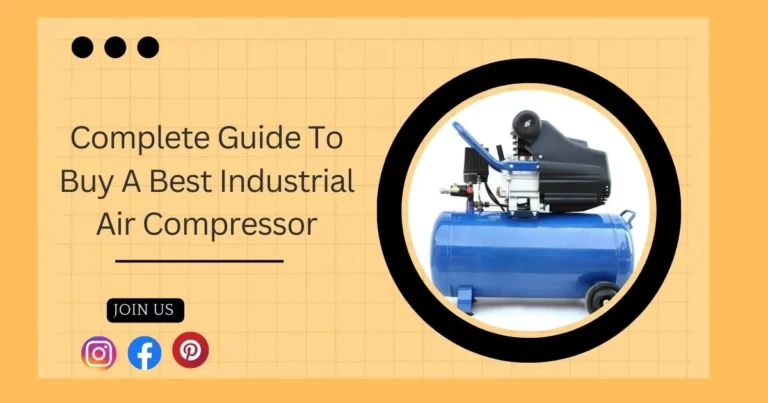
Industrial air compressors are essential because they supply the compressed air needed to operate pneumatic tools, control systems, and complete other crucial tasks in a variety of industries. Since they guarantee effective, dependable, and affordable solutions for a variety of applications, they have grown to be indispensable for many manufacturing processes. The significance of industrial air compressors and the things to take into account when buying one for your company are covered in this article.
Buy Best Air Compressor for yourself with all the features in our List of Best Portable Air Compressors under $100.
Table of Contents
ToggleA. The Importance of Industrial Air Compressors
Many different industries, including manufacturing, construction, automotive, oil and gas, and food processing, depend on industrial air compressors. These compressors transform mechanical or electrical energy into pressurized air’s potential energy, which can then be used to operate pneumatic tools or complete a variety of tasks. The following are a few major advantages of using industrial air compressors:
- Improved productivity: Enhanced productivity is possible thanks to the use of pneumatic tools, which are frequently more dependable, faster, and more powerful than manual or electric alternatives. Increased productivity and efficiency across a range of tasks and processes can result from this.
- Energy efficiency: Since industrial air compressors only need one motor to produce compressed air, which can then be used for numerous applications, they can be more energy-efficient than other power sources.
- Versatility: Compressed air is a flexible solution for various industries because it can be used for a variety of tasks, such as cleaning, painting, sandblasting, and powering pneumatic tools.
- Reliability: Industrial air compressors are built to withstand harsh environments and heavy-duty use, providing dependable performance.
B. Factors to Consider When Buying an Industrial Air Compressor
Consideration must be given to a number of factors when choosing the ideal industrial air compressor for your company, including
- Size and capacity: Take your operation’s air demand into account when choosing a compressor size. This involves evaluating the tank size, pressure rating, and CFM (cubic feet per minute) output of the compressor.
- Power source: Depending on the power requirements and availability at your facility, choose an electric or gas-powered compressor.
- Type of compressor: There are various types of air compressors, including centrifugal, rotary screw, and reciprocating models. The choice depends on your particular needs and each type has advantages and disadvantages.
- Energy efficiency: To lower energy costs and environmental impact, choose an energy-efficient compressor.
- Maintenance requirements: Consider the compressor’s maintenance requirements, including how frequently the oil needs to be changed, the filters need to be replaced, and general maintenance.
- Noise level: Consider the noise level and whether it might affect your working environment when choosing an industrial air compressor because some of them can be quite loud.
- Budget: Establish your spending limit and look for a compressor that satisfies it while staying within it.
- Warranty and after-sales support: To make sure your investment is protected, choose a reputable manufacturer that provides a solid warranty and dependable after-sales support.
Providing the necessary compressed air to power tools and completing various tasks, industrial air compressors are crucial for a variety of industries. When choosing an industrial air compressor for your company, you can make an informed choice by carefully weighing the factors covered in this article.
Understanding the Types of Industrial Air Compressors
Positive Displacement Compressors
Positive displacement compressors function by mechanically reducing a fixed volume of trapped air to raise pressure. This group of compressors consists of:
a) reciprocate Compressors
Air is compressed using a piston inside of a cylinder by reciprocating compressors, also called piston compressors. Air is drawn in during the intake stroke of the piston’s motion and compressed during the compression stroke. Single-stage or multistage reciprocating compressors are both available, with multistage compressors offering higher pressure output. These compressors are frequently used in small- to medium-sized industrial settings, such as car dealerships and building sites.
b) Rotary Screw Compressors
Two tightly mated helical rotors (screws) are the main component of rotary screw compressors. The rotors draw air in at one end and compress it as it passes through the screws as they spin. Rotary screw compressors are renowned for their constant operation, minimal noise production, and high level of energy effectiveness. Larger industrial applications, like factories and processing facilities, frequently use them.
c) Rotary Vane Compressors
A rotor with numerous vanes that slide in and out of slots as the rotor spins is used in rotary vane compressors. As the rotor rotates inside a cylindrical casing, these vanes enclose and compress air. Rotary vane compressors are small, low maintenance, and provide reliable performance. They are frequently employed in systems like pneumatic systems, HVAC systems, and vacuum pumps.

Dynamic Compressors
In order to increase air pressure, dynamic compressors, also referred to as turbo compressors, give the air kinetic energy, which is then transformed into potential energy (pressure). The following are the two main types of dynamic compressors:
a) Centrifugal Compressors
Air is accelerated by an impeller and then slowed down by a diffuser in centrifugal compressors. The air pressure rises as a result of this process, which transforms kinetic energy into potential energy. The advantages of centrifugal compressors include their high flow rates, minimal maintenance needs, and capacity for handling large volumes of air. They are frequently used in high-capacity air compressions applications like those found in chemical plants, power generation facilities, and oil and gas refineries.
b) Axial Flow Compressors
An array of rotating airfoils (blades) mounted on a central shaft make up axial flow compressors. The rotating blades of the compressor accelerate the air as it travels through it parallel to the axis of the shaft, increasing its kinetic energy. This kinetic energy is converted into pressure by succeeding stationary blades. Aircraft engines and gas turbines are two examples of high-speed, high-flow applications that frequently employ axial flow compressors.
choosing the appropriate industrial air compressor for your unique needs requires an understanding of the various types of industrial air compressors. The choice will depend on elements like the required pressure, flow rate, and the nature of your application, each of which has advantages and disadvantages. Understanding the various compressor types will help you make an informed choice that best suits the needs of your company.
Power Source Options for Industrial Air Compressors
The effectiveness, expense, and environmental impact of your operations can all be impacted by the power source you choose for your industrial air compressor. Electric, gas, and diesel are the three main types of power sources available for industrial air compressors. The benefits and drawbacks of each power source will be covered in this article to aid in your decision-making.
A. Electric Air Compressors
Advantages:
- Energy efficiency: a. Energy efficiency: Compared to their gas or diesel counterparts, electric air compressors typically use less energy, which lowers running expenses.
- Environmentally friendly: Electric compressors emit no emissions when in use, making them a sustainable choice.
- Low noise levels: Compared to gas or diesel compressors, electric compressors often produce less noise, making the workplace quieter.
- Low maintenance: Compared to gas or diesel compressors, electric compressors have fewer moving parts and require less maintenance.
Disadvantages:
- Limited mobility: Because electric compressors must be connected to the electrical grid, in some circumstances this can restrict their flexibility.
- Initial cost: Although operating costs are frequently lower over time, electric compressors may have a higher initial cost than gas or diesel compressors.
B. Gas-Powered Air Compressors
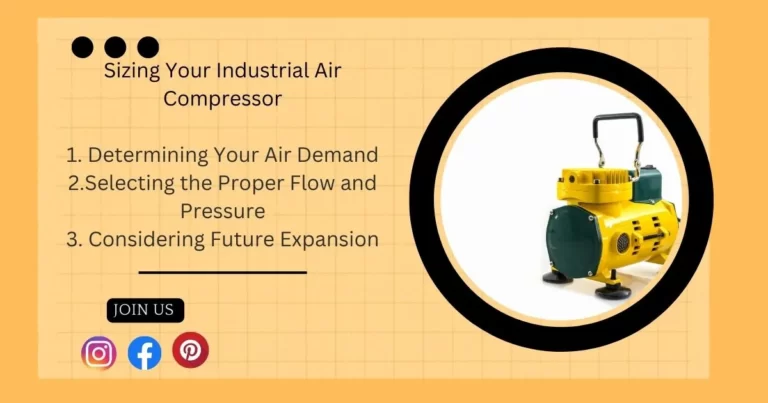
- INAROCK Garden Tiller
Features
- Powerful: 8.5 amp pure copper motor
- providing 380rpm high speed, high torque grinding, strong power, and efficient operation.
- Cultivates up to 14″ wide x 8″ deep, 4 steel tilling blades for maximum durability and performance.
- Double safety switches provide double protection. safety button on/off the trigger to start the machine.
Sizing Your Industrial Air Compressor
Making the appropriate size choice for your industrial air compressor is essential for the smooth operation of your company. Your tools and equipment must have enough compressed air to function effectively, and a properly sized compressor ensures this while also consuming less energy and costing less to maintain. By figuring out your air demand, selecting the proper pressure and flow, and taking future expansion into account, this article will walk you through the process of sizing your industrial air compressor.
a) Determining Your Air Demand
Making a list of all the pneumatic tools and equipment you use in your facility is a good place to start. You can use this to calculate the overall air consumption needed for your operations. Verify the air consumption requirements: For information on the air consumption rates for each tool or piece of equipment, commonly expressed in cubic feet per minute (CFM) or liters per minute (L/min), consult the manufacturer’s specifications.
Calculate the total air demand for your facility by adding up the air consumption rates of all of your tools and equipment. Take into account each tool’s duty cycle (the proportion of time it is in use) and whether or not all tools will be used continuously or sporadically. Apply a safety factor: When calculating your total air demand, add a safety factor of between 10 and 20 percent to account for potential errors and unforeseen air demands.
b) Selecting the Proper Flow and Pressure
To ascertain the necessary pressure (measured in pounds per square inch, or PSI), consult the manufacturer’s specifications for each item or piece of equipment. Select a compressor that can provide the highest pressure necessary for your heaviest tool. Choose a suitable flow rate: Select a compressor with a flow rate (CFM) that satisfies or exceeds the total air demand you calculated, taking the safety factor into account. Make that the compressor can continue to deliver the needed flow rate at the requisite pressure.
c) Considering Future Expansion
Consider prospective business developments that could raise your air consumption, such as the addition of additional tools, equipment, or manufacturing lines, when sizing your industrial air compressor. Plan ahead by choosing a compressor with a capacity that will allow for future expansion to ensure that you won’t need to replace it if your air demand rises. Purchasing a slightly bigger compressor now will be more cost-effective than replacing a smaller one later on.
The flexibility to add more compressors or components as your air demand increases are made possible by the modularity and scalability of some compressor systems. For companies whose air requirements are uncertain or expanding quickly, this may be a workable alternative.
choosing the right size for your industrial air compressor is crucial for reliable operation and effective operation. You can make sure that your compressor fulfills your company’s demands while consuming the least amount of energy and spending the least amount on maintenance by calculating your air demand, selecting the appropriate pressure and flow, and taking future growth into account.
Power Source Options for Industrial Air Compressors
The effectiveness, expense, and environmental impact of your operations can all be impacted by the power source you choose for your industrial air compressor. Electric, gas, and diesel are the three main types of power sources available for industrial air compressors. The benefits and drawbacks of each power source will be covered in this article to aid in your decision-making.
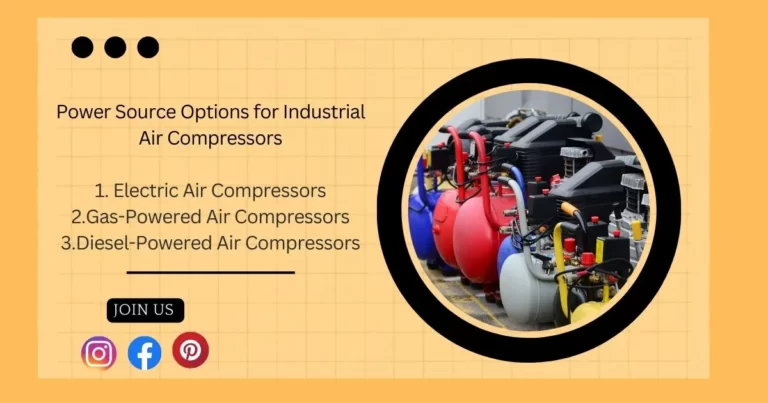
A. Electric Air Compressors
Advantages:
- Energy efficiency: a. Energy efficiency: Compared to their gas or diesel counterparts, electric air compressors typically use less energy, which lowers running expenses.
- Environmentally friendly: Electric compressors emit no emissions when in use, making them a sustainable choice.
- Low noise levels: Compared to gas or diesel compressors, electric compressors often produce less noise, making the workplace quieter.
- Low maintenance: Compared to gas or diesel compressors, electric compressors have fewer moving parts and require less maintenance.
Disadvantages:
- Limited mobility: Because electric compressors must be connected to the electrical grid, in some circumstances this can restrict their flexibility.
- Initial cost: Although operating costs are frequently lower over time, electric compressors may have a higher initial cost than gas or diesel compressors.
B. Gas-Powered Air Compressors
Advantages:
- Mobility: Since gas-powered compressors do not need to be connected to the electrical grid, they are more mobile and flexible in locations where electricity might not be easily accessible.
- Power output: Gas-powered compressors have a high power output, which makes them appropriate for heavy-duty applications.
Disadvantages:
- Higher emissions: When operating, gas-powered compressors produce pollutants that may be harmful to the environment.
- Noise levels: Gas compressors typically make more noise than electric compressors, which can make the workplace noisy.
- Maintenance: Due to their internal combustion engines, gas compressors often require more maintenance than electric compressors.
C. Diesel-Powered Air Compressors
Advantages:
- Mobility: Diesel-powered compressors are more mobile and flexible in off-the-grid areas than gas-powered compressors because they don’t need to be connected to the electrical grid.
- High power output: Diesel compressors have the capacity to produce large amounts of power, making them ideal for demanding tasks and significant projects.
Disadvantages:
- Environmental impact: When operating, diesel compressors emit emissions that contribute to air pollution and greenhouse gas emissions.
- Noise levels: The working environment may be impacted by the noise levels of diesel compressors.
- Maintenance: Due to their internal combustion engines, diesel compressors typically need more regular maintenance than electric compressors.
There are benefits and drawbacks to each power source choice for industrial air compressors. Although they are environmentally friendly and energy-efficient, electric compressors may not be very mobile. While offering greater mobility and power output, gas and diesel compressors also produce emissions and require more maintenance. You may choose the finest power source for your industrial air compressor by carefully taking into account your unique requirements, such as mobility, power needs, and environmental impact.
Industrial Air Compressor Reviews
Introduction
Industrial air compressors are made to handle demanding tasks and deliver a consistent flow of compressed air to a variety of industries. It can be difficult to choose the best industrial air compressor for your particular needs from the wide range of options on the market. To assist you in making an informed choice, we’ll review and suggest a few of the best industrial air compressors in this article.
Top Industrial Air Compressor Reviews
Ingersoll Rand 2340L5-V
The 2340L5-V is a testament to Ingersoll Rand’s standing as a trusted name in the air compressor sector. This 5-HP, two-stage air compressor is appropriate for a variety of industrial applications due to its maximum pressure of 175 PSI. Longevity is guaranteed by the sturdy cast-iron construction, and the 60-gallon tank offers plenty of storage space. Users value its dependable performance, minimal maintenance needs, and generally quiet operation.
Quincy QT-54
A 5-HP, two-stage air compressor with heavy-duty industrial applications is the Quincy QT-54. It can handle demanding applications with ease thanks to a 60-gallon tank and a maximum pressure of 175 PSI. The compressor has a patented pump design for greater efficiency and durability, along with an industrial-duty Baldor motor made in the US. The QT-54 is praised for its reliable performance, minimal maintenance needs, and top-notch customer service.
Atlas Copco GA22+
Another well-known manufacturer of air compressors is Atlas Copco, and their GA22+ model is a shining example of their high caliber goods. This 30-HP rotary screw air compressor can operate continuously in a variety of industries thanks to its maximum pressure of 125 PSI and flow rate of 129 CFM. For optimum performance, the compressor has an energy-efficient motor and cutting-edge control systems. Its dependability, energy efficiency, and low noise levels are appreciated by users.
Sullair ShopTek ST510
A 10-HP rotary screw air compressor with heavy-duty industrial applications is the Sullair ShopTek ST510. It ensures a steady supply of compressed air with a maximum pressure of 175 PSI and a flow rate of 38 CFM. Sullair’s air-end technology and the compressor’s small size contribute to its increased efficiency and dependability. Users laud its effectiveness, robustness, and simplicity of maintenance.
Conclusion
It is essential to take into account aspects like your unique application requirements, the compressor’s maximum pressure, the tank capacity, and the compressor’s overall efficiency and dependability when choosing the best industrial air compressor for your requirements. Based on their effectiveness, dependability, and customer satisfaction, the four industrial air compressors mentioned above come highly recommended. The final decision will be based on your particular requirements and available funds, but these reviews are a great place to start your search for the ideal industrial air compressor.
Industrial Air Compressor Price: Understanding Costs and Factors Affecting Price
Introduction
Given the wide range of sizes, capacities, and types of industrial air compressors, it is challenging to give a price that applies to all of them. Depending on a number of factors, the price of an industrial air compressor can range from a few thousand dollars to tens of thousands of dollars. The main determinants of industrial air compressor prices will be covered in this article, along with a general price range for various compressor types.
Factors Affecting Industrial Air Compressor Prices
- Type of Compressor: There are several different types of industrial air compressors, including centrifugal, rotary screw, and reciprocating compressors. Due to their higher efficiency, performance, and durability, rotary screws and centrifugal compressors are typically more expensive than reciprocating compressors.
- Capacity and Pressure: A major determinant of an air compressor’s price is its capacity, which is expressed in CFM, and maximum pressure, expressed in PSI. Compressors with greater capacity and pressure are typically more expensive because of the improved performance they offer.
- Horsepower and Motor Quality: The price of an air compressor is directly influenced by the horsepower of its motor. Since they offer more power and performance, higher horsepower motors are typically more expensive. The price may also be influenced by the motor’s effectiveness and quality.
- Brand and Warranty: The air compressor brand’s standing and the warranty being provided can affect the cost. Due to the assurance of quality and customer support they offer, reputable brands with solid warranties may charge a premium for their products.
- Additional Features: Industrial air compressors with sophisticated features will typically cost more than simpler models. Examples include variable speed drives, integrated dryers, and sophisticated control systems.
General Price Range for Industrial Air Compressors
- Reciprocating Compressors: Depending on capacity, pressure, and brand, reciprocating industrial air compressors can cost anywhere from $1,000 to $10,000 or more.
- Rotary Screw Compressors: Prices for rotary screw industrial air compressors can range from $3,000 to $50,000 or more, depending on the model, brand, and extra features.
- Centrifugal compressors: Due to their high performance and efficiency, centrifugal industrial air compressors are typically the most expensive, with prices starting at $20,000 and going up to $100,000 or more.
Conclusion
Depending on the type, capacity, pressure, brand, and extra features, an industrial air compressor’s cost can vary significantly. It is crucial to take into account your unique needs, spending limit, and desired performance when choosing the best compressor for your needs. To make sure you are getting the best value for your investment, it is also critical to conduct research on and compare various air compressor models and brands.
FAQs
How do I choose an industrial air compressor?
To choose an industrial air compressor in 4 lines:
- Consider the required airflow, pressure, and duty cycle.
- Choose a rotary screw compressor for reliability, durability, and high volume.
- Choose a reciprocating compressor for lower cost and airflow.
- Compare brands and models to find the best value for your budget.
What is the best brand of air compressor?
The best brand of air compressor depends on your specific needs and budget. However, some of the most popular and well-regarded air compressor brands include
Which air compressor is best for industrial use?
Rotary screw air compressors are the most common type of industrial air compressor, and for good reason. They are reliable, durable, and can produce a high volume of compressed air at a consistent pressure.

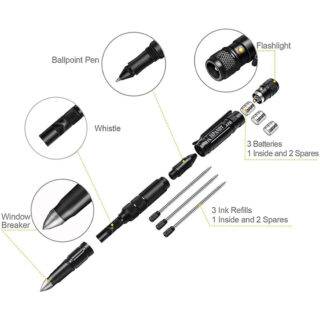
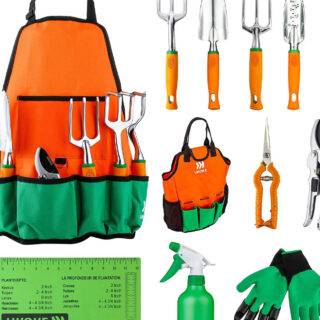
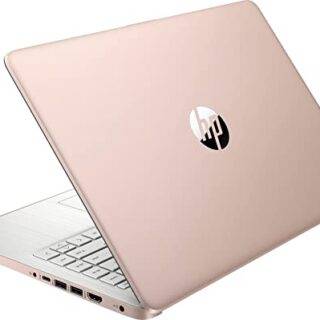
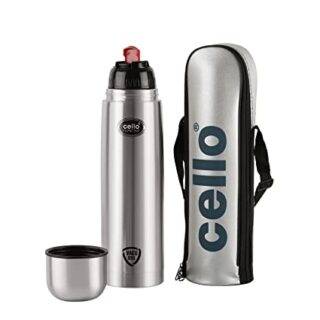
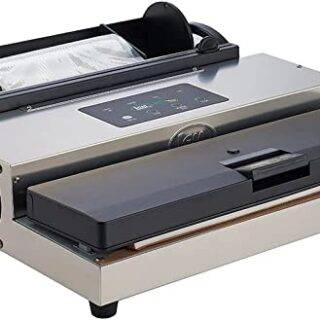

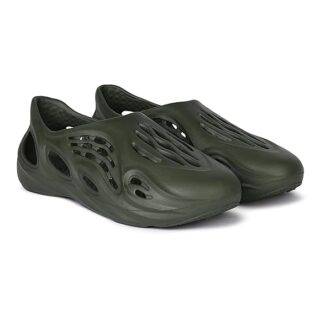


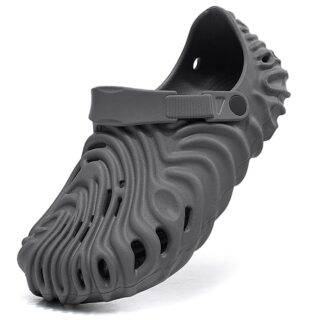
Leave a Reply